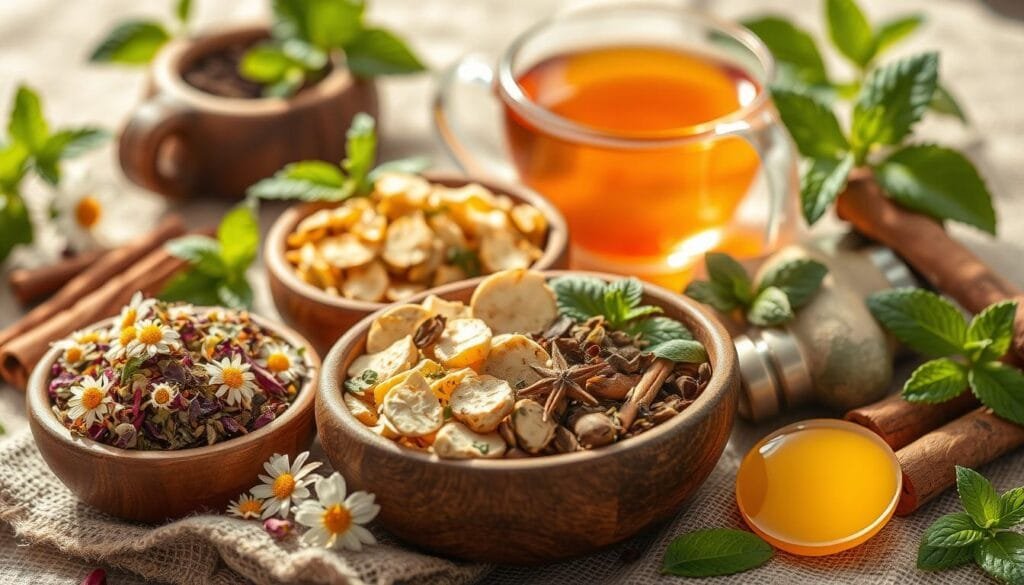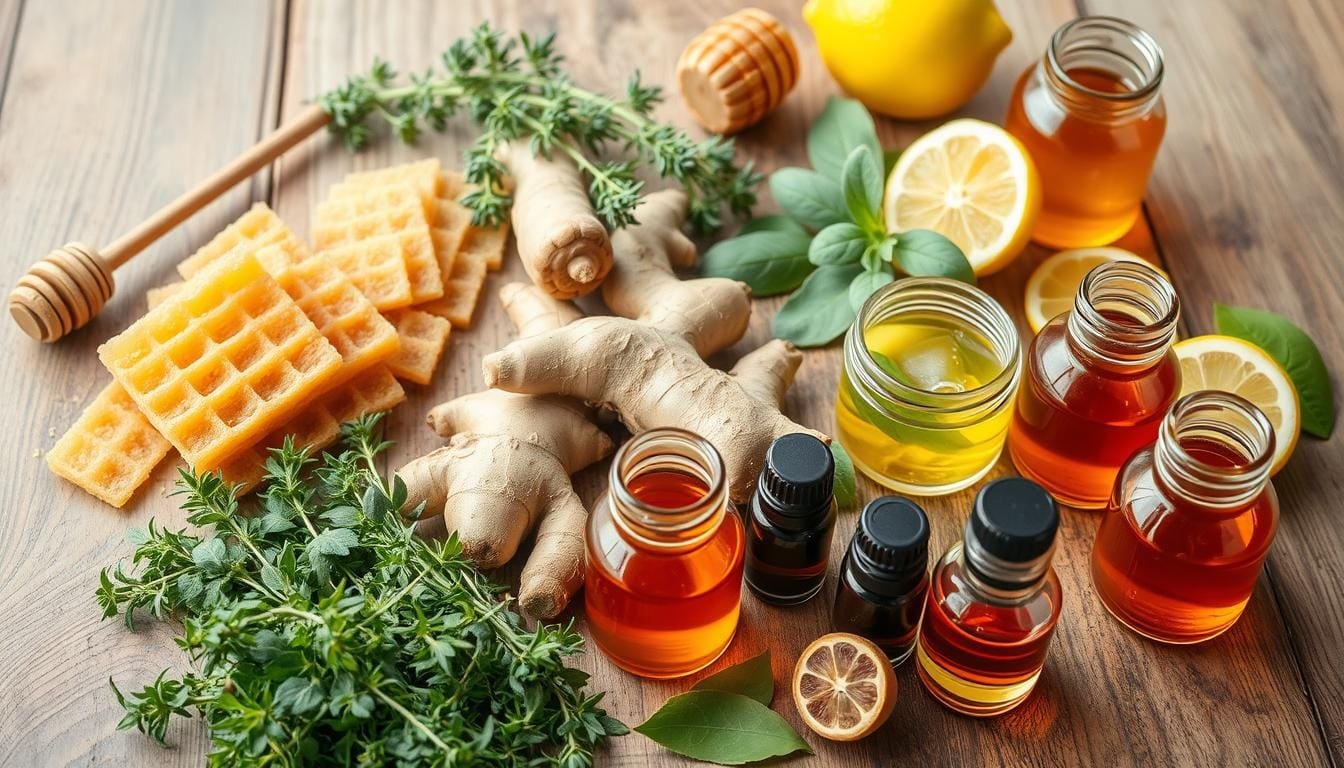I’ve found that natural herbs can really help with coughs and colds. Honey, ginger, thyme, marshmallow root, and peppermint are great for soothing sore throats and calming coughs. They also help our bodies fight off cold and flu viruses.
Honey is amazing for coughs, even better than some medicines. Studies show it works well at night and can stop the need for antibiotics. Ginger and thyme help by reducing inflammation and coughs. Marshmallow root soothes the throat, and peppermint helps clear out mucus.
These natural remedies do more than just ease symptoms. They also boost our immune system. By using plants, we can find safe and effective ways to handle cold and flu symptoms.
Understanding How Natural Remedies Work Against Cold Symptoms
Our bodies have a natural defense against cold and flu. This defense includes fever, coughing, and more. These actions help get rid of bad germs and speed up healing. By knowing how our bodies work, we can pick herbal remedies that help our immune system.
The Body’s Natural Defense Mechanisms
A fever makes it hard for viruses and bacteria to survive. It usually lasts a day or two and helps us get better faster. Coughing helps clear our airways of mucus and irritants.
Role of Herbs in Supporting Immune Response
Herbs like echinacea and ginseng boost our immune system. Research shows echinacea can cut cold symptom time by 10%-30%. Early zinc use may also shorten illness.
Benefits of Natural vs. Synthetic Treatments
Natural remedies often have fewer side effects than drugs. For example, elderberry extract cuts flu symptom days in half. Garlic may also boost immunity and prevent colds.
Knowing how our bodies and herbs work together is key. Natural treatments can help us feel better while keeping our health in check.
“The human body has an amazing capacity to heal itself, and natural remedies can play a supportive role in that process.”
Honey: Nature’s Most Powerful Cough Suppressant
Honey is a top choice for natural cough relief. Studies show it works better than many cough medicines. It’s also great for night-time coughs that keep you awake.
Honey’s thick texture soothes the throat, giving quick relief. It also has compounds that fight infections and reduce inflammation. This helps to stop coughing at its source.
For honey benefits and natural cough relief, take 0.5 to 1 teaspoon before bed. You can take it straight or mix it with warm herbal tea. It’s safe for kids over 1 year old, making it a good choice for families.
“Honey appeared to work as well as diphenhydramine, a common ingredient in over-the-counter cough medicines, in these studies.”
But, honey is not safe for babies under 1 year old because of botulism risk. For everyone else, it’s a natural and safe way to fight coughs and sleep better.
More studies are needed to fully understand honey’s benefits. But the current research is very encouraging. So, if you or a loved one has a cough, try honey. It’s a natural and effective solution.
Essential Herbs for Treating Coughs and Colds
Nature gives us many herbal remedies for coughs and colds. Three herbs stand out for their ability to ease respiratory symptoms and boost our defenses.
Thyme for Respiratory Support
Thyme is a strong ally for our lungs. It has flavonoids that reduce inflammation and relax the throat. This makes it easier to cough up mucus and find relief from coughs. Studies show thyme is great for treating respiratory problems.
Ginger’s Anti-inflammatory Properties
Ginger is a natural hero for colds and coughs. It has anti-inflammatory and cough-suppressing properties. Ginger breaks down mucus and soothes the throat. Adding ginger to your cold-fighting plan can help a lot.
Marshmallow Root for Throat Coating
Marshmallow root is a hidden gem for sore throats. It’s rich in mucilage, which forms a protective coating. Marshmallow root tea or lozenges can be a big help for sore throats during colds.
These three herbs – thyme, ginger, and marshmallow root – are natural ways to fight cold and cough symptoms. Using them in teas, syrups, or other remedies can offer real relief and support your body’s defenses.

Powerful Healing Properties of Peppermint and Eucalyptus
Peppermint and eucalyptus are top natural remedies for cold and cough. Peppermint has menthol that helps sore throats and breaks down mucus. Eucalyptus oil helps with breathing by being a decongestant.
These herbs are in many cold and cough medicines. But, they can be risky for young kids. They might cause breathing spasms. Always check with a doctor before using them.
Use peppermint and eucalyptus to fight cold and cough. Eucalyptus oil works well in steam inhalations. Peppermint tea or lozenges can ease a sore throat. Always mix essential oils with a carrier oil and keep them out of kids’ reach.
“Eucalyptus essential oil is being investigated as a possible anti-TB drug. Cinnamon essential oil is effective against respiratory pathogens when diffused.”
Nature’s remedies can help with cold and cough without synthetic drugs. Always put safety first and talk to a doctor if symptoms don’t get better.
The Benefits of Menthol
Menthol in peppermint is key to its healing. It:
- Soothes sore throats by numbing pain
- Helps clear mucus from the airways
- Gives a cooling feeling that eases chest tightness
Peppermint oil, with its menthol, is a favorite for quick relief and comfort.
Traditional Herbal Tea Blends for Cold Relief
When you’re fighting a cold, herbal tea blends can be a big help. These teas not only soothe but also use herbs to fight cold symptoms. They boost your immune system and ease a sore throat, making them a tasty way to feel better.
Best Herbs for Therapeutic Teas
Some top herbs for cold relief teas are:
- Ginger: It fights inflammation and helps clear your chest and throat.
- Thyme: It thins mucus and supports your breathing.
- Peppermint: Its menthol cools your throat and eases congestion.
- Marshmallow root: It soothes your throat and makes it feel better.
Proper Brewing Methods
To get the most out of these teas, brew them right. Steep the herbs in hot water for 5-10 minutes. Marshmallow root might need up to 15 minutes.
Recommended Dosage and Timing
Drink 2-3 cups of these teas a day. Some teas work better before bed to help you sleep and stop coughing at night.

Adding these herbal tea blends to your cold-fighting routine can be very helpful. They use nature’s power to help your body heal. Enjoy these teas and feel your way to wellness.
Steam Inhalation Therapy with Medicinal Herbs
When cold and flu season hits, finding natural remedies can be a big help. Steam inhalation with medicinal herbs is a centuries-old method. It offers relief from congestion, coughing, and other cold symptoms.
To do it, just add a few drops of essential oils or some fresh or dried herbs like eucalyptus, peppermint, or thyme to hot water. Then, cover your head with a towel over the bowl and breathe in the steam. This moist heat loosens mucus and soothes your nose and airways.
Herbal steam therapy is a cost-effective and easy way to feel better. Research shows it can ease respiratory illness symptoms, hydrate your nose, and even help you sleep better. It’s a strong ally in fighting colds naturally.
To use herbal steam therapy safely, keep each session short, 10-15 minutes. Repeat it two to three times a day if needed. Be careful, kids, to avoid burns. With a bit of care, you can use nature’s power to breathe easier and recover faster.
Adding steam inhalation with medicinal herbs to your self-care can help manage cold and flu symptoms. It’s great for congestion, coughs, or feeling generally unwell. This simple, natural method might just be what you need to feel better and support your body’s healing.
Natural Decongestants and Expectorants from the Garden
Nature has many herbs and plants that help with nasal congestion and mucus. You can find these natural decongestants and expectorants in your garden and kitchen. They offer safe and effective relief for coughs and colds.
Herbs That Break Up Congestion
Horseradish, garlic, and onions have compounds that break up mucus. This makes it easier to expel. Ginger and turmeric reduce sinus pressure and swelling with their anti-inflammatory properties.
Peppermint and eucalyptus oils provide a cooling effect when used in steam inhalation. This helps decongest the nasal passages.
Safe Usage Guidelines
Start with small amounts of natural decongestants and expectorants. Avoid using essential oils internally. Always check with a healthcare provider before using herbs, for children, pregnant women, or those with health conditions.
Following proper dosage instructions is key for safe use. By using nature’s decongestants and expectorants, you can find gentle relief for cold and cough symptoms. This way, you avoid harsh synthetic medications.
| Herb | Decongestant/Expectorant Properties | Suggested Usage |
|---|---|---|
| Horseradish | Contains compounds that help break up mucus | Add to soups, stews, or take as a tincture |
| Garlic | Possesses antimicrobial and mucus-thinning properties | Consume raw, roasted, or in supplement form |
| Onions | Rich in sulfur compounds that can loosen mucus | Add to dishes or consume raw |
| Ginger | Has anti-inflammatory effects that can reduce sinus congestion | Drink ginger tea, add to stir-fries, or take as a supplement |
| Turmeric | Possesses antioxidant and anti-inflammatory properties | Add to curries, smoothies, or take as a supplement |
| Peppermint | The menthol in peppermint can provide a cooling, decongesting effect | Use in steam inhalation or drink peppermint tea |
| Eucalyptus | The eucalyptol in eucalyptus can help clear nasal passages | Use in steam inhalation or add a few drops to a diffuser |

Remember, natural remedies can be effective but always consult a healthcare professional. This is important for children, pregnant women, or individuals with health conditions. Safety and proper usage should be your top priority when using natural decongestants and expectorants.
Combining Herbs with Other Natural Remedies
When treating colds and coughs, using a holistic approach is key. This means combining complementary treatments for better results. Herbal remedies work well with other natural solutions to improve your health.
Adding honey to herbal teas can make them even more soothing. Honey is known for its natural cold remedy properties. It helps soothe an irritated throat. Try thyme or ginger tea with honey for a great cough and cold relief.
Salt water gargling is another helpful therapy. It reduces throat swelling and inflammation. Using herbal treatments and salt water together can tackle your symptoms from different angles.
Drinking enough fluids, like warm broths, is also important. It helps thin out mucus and aids in detoxification. Mix your herbal remedies with warm liquids for better decongestant and expectorant effects.
Remember, rest and a nutrient-rich diet are vital too. Herbs offer specific support, but a strong immune system is essential. Include foods high in vitamin C, like citrus fruits and bell peppers, to boost your immune system.
By using a holistic approach that combines herbs with other natural therapies, you can tackle cold and cough symptoms more effectively. This approach leads to better and longer-lasting relief.

Safety Considerations and Possible Interactions
Herbal remedies can help manage cold and flu symptoms naturally. But, we must be careful. Some herbs can be risky, like for pregnant women, kids, or people with health issues. Knowing the risks and interactions helps us use these natural treatments safely.
Herbs to Avoid During Pregnancy
Pregnant women need to be extra careful with herbs. Licorice root and sage might harm the baby or affect the uterus. Always talk to a doctor before trying any herbal remedies while pregnant.
Drug Interactions to Watch For
Herbs can change how medicines work. For instance, ginger and garlic might affect blood thinners. St. John’s Wort can make birth control pills less effective. Tell your doctor about any herbal supplements you’re taking.
When to Consult a Healthcare Provider
Even safe herbs should be checked with a doctor, if you have health issues, are pregnant, or on meds. If your symptoms get worse or you have a high fever, see a doctor right away.
Knowing the risks lets us use herbs safely for our health. Always talk to your doctor about natural remedies. This ensures we use them wisely and safely.
Making and Storing Herbal Remedies at Home
As someone who loves natural health, I’ve found making my own herbal remedies at home is great. It’s cheaper and lets me tailor treatments for cold and cough symptoms. I enjoy brewing teas and making cough syrups. The trick is to use top-notch, fresh or dried herbs and follow tested methods.
Making herbal teas is simple. I just steep herbs like ginger, turmeric, peppermint, or thyme in hot water. For syrups, I simmer herbs in water and add honey for a sweet cough remedy. I also make steam blends with eucalyptus, peppermint, and herbs like garlic and oregano for breathing help.
Storing homemade remedies right is important to keep them strong and fresh. I store dried herbs in airtight containers, away from light and heat. Teas and syrups go in the fridge and are used within a week. I label each batch with what’s in it and when I made it. While homemade remedies work well, it’s vital to use trusted sources for herbs to stay safe.







